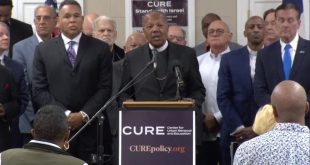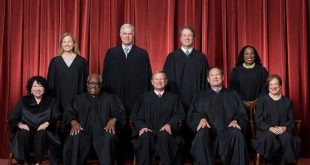Lawmakers passed the Civil Rights Act of 1964 to protect black Americans from racial discrimination in education, employment, and public accommodations, and also barred discrimination based on sex, religion, and national origin.
The homosexual lobby has attempted to co-opt these protections for themselves for a long time. They believe the law should grant them rights based on sexual behavior and fantasies about being the opposite sex. They believe sexual behavior is equivalent to immutable characteristics like race and sex.
And six of the U.S. Supreme Court’s justices apparently agree with them.
The nation’s highest court heard arguments in three consolidated discrimination cases. In one case, a county in Georgia fired a longtime homosexual employee for conduct “unbecoming.” In the second case, a private business fired an employee for being homosexual. The third case involved Harris Funeral Homes. The owner established a sex-specific dress for employees so they wouldn’t distract grieving families saying goodbye to loved ones. The funeral director, who agreed to the dress code when hired, decided he’d dress as a woman while at work. He and the owner parted ways.
The nation’s highest court ruled on Monday that the owner was wrong. The court held that any employer who fires an individual for being “gay or transgender” has violated Title VII.
Chief Justice John Roberts and Justice Neil Gorsuch voted with the liberal justices. Justice Samuel Alito dissented, with Justice Clarence Thomas joining his opinion. Justice Brett Kavanaugh wrote a separate dissenting opinion.
Justice Gorsuch, who wrote the majority opinion (PDF), actually referred to the man in the Harris case as “she.” Here’s what he wrote concerning the issue of religious freedom:
We are also deeply concerned with preserving the promise of the free exercise of religion enshrined in our Constitution; that guarantee lies at the heart of our pluralistic society. But worries about how Title VII may intersect with religious liberties are nothing new; they even predate the statute’s passage. As a result of its deliberations in adopting the law, Congress included an express statutory exception for religious organizations.
Justice Gorsuch noted that Congress created exceptions to Title VII for religious organizations and later passed the Religious Freedom Restoration Act (RFRA), but because Harris Funeral Homes didn’t seek the court’s review of its unsuccessful RFRA defense at lower court, the high court didn’t consider it. Justice Gorsuch added that none of the other employers in the case alleged that the reinterpretation of Title VII infringes on their religious freedom.
Justice Alito contended in his dissenting opinion that the court has written law. “The document that the Court releases is in the form of a judicial opinion interpreting a statute, but that is deceptive.” Sexual orientation and gender identity don’t appear on the Civil Right’s Acts list of classifications, and bills introduced in Congress to redefine “sex” have failed to pass.
“A more brazen abuse of our authority to interpret statutes is hard to recall,” Justice Alito wrote. The majority’s argument “is not only arrogant, it is wrong. It fails on its own terms. ‘Sex,’ ‘sexual orientation,’ and ‘gender identity’ are different concepts, as the Court concedes…And neither ‘sexual orientation’ nor ‘gender identity’ is tied to either of the two biological sexes.”
Justice Kavanaugh also contended that the legislative branch decides whether to expand Title VII, not the judiciary.
Under the Constitution’s separation of powers, our role as judges is to interpret and follow the law as written, regardless of whether we like the result. Cf. Texas v. Johnson, 491 U. S. 397, 420–421 (1989) (Kennedy, J., concurring). Our role is not to make or amend the law. As written, Title VII does not prohibit employment discrimination because of sexual orientation.
Alliance Defending Freedom, Harris Funeral Homes’s legal counsel, noted the implications of this decision:
The bottom line is that ignoring biological reality in our laws threatens our freedoms of conscience, religion, and speech.
There’s more.
By ruling in the similar case decided today that “sex” in federal employment law also includes “sexual orientation,” the Court made it more difficult for employers and employees who hold the longstanding, honorable belief that marriage is only between one man and one woman.
The ruling could prohibit a religious employer from declining to recognize a same-sex relationship as a “marriage” for purpose of benefits. It could subject a small business owner to liability if she discusses her beliefs about marriage while at work. It could even result in an employee being disciplined or fired for even mentioning her beliefs about marriage, as happened to Chief Kelvin Cochran, who was fired as Atlanta’s Fire Chief after writing a small book about his beliefs in Christ and about marriage for his private, men’s Bible study.
That is why this Supreme Court ruling should concern us all.
 CURE News and Clergy Blog News and Commentary for Christians
CURE News and Clergy Blog News and Commentary for Christians




This is troubling for Christian businesses as well as Churches. The only thing that I can think of to protect our ability to operate without the possibility of successful lawsuits is for our statement of faith to be very specific to marriage, sanctity of life etc.. written in the contract. Just as long as it applies to everybody. Corporations have values that employees have to abide by.
Will BCN and/or other Christian organizations take up the cause to address this issue because it infringes upon our religious freedom.